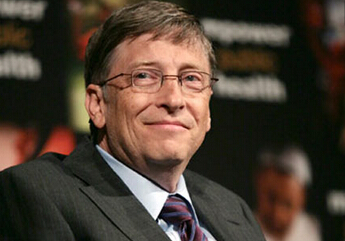Bill Gates says raising chickens could help improve the lives of people living in extreme poverty throughout the world.
比爾·蓋茨稱養(yǎng)雞可以改善世界各地極端貧困人民的生活。
That's why the Bill and Melinda Gates Foundation is working to create a sustainable market system for poultry in sub-Saharan Africa, where the U.N. says 41 percent of people live in extreme poverty.
這就是比爾和梅林達蓋茨基金會致力于在撒哈拉以南非洲建立可持續(xù)家禽市場體系的原因,聯(lián)合國稱那里百分之41的人民生活極度貧困。
In a blog post on the foundation's website, Gates explains four reasons why he thinks chickens are the best solution.
在基金會網(wǎng)站上的一篇博客文章中,蓋茨用四個理由解釋為什么養(yǎng)雞是最好的解決辦法。
For one, chicken aren't picky eaters, so they're pretty cheap to feed.
其一,雞不挑食,喂養(yǎng)起來相當便宜。

They're also profitable. In West Africa, chickens sell for $5 each, and assuming you have a way to fertilize the eggs, a flock of five can turn into a flock of 40 in three weeks. Keep in mind, Gates' plan is aimed at people living on $2 a day.
同樣它們是有利潤的。在西非,雞的售價為5美元,假如你有辦法讓蛋受精,三個星期五只一群可以變成四十只一群。記住,蓋茨的計劃是針對每日靠2美元生活的人。
Their eggs are also a good source of protein and other nutrients if you decide to eat them instead of sell them.
如果你打算吃而不是出售,同樣這些雞蛋是蛋白質(zhì)和其他營養(yǎng)物的很好來源。
And they empower women. Raising chickens not only allows women to stay close to home but also builds up some economic power.
而且這賦予婦女權(quán)力。養(yǎng)雞不僅可以讓婦女呆在家里附近,而且還可以建立一些經(jīng)濟力量。
The foundation says 5 percent of rural families in sub-Saharan Africa raise good breeds of vaccinated chickens.
基金會稱,百分之五的撒哈拉以南非洲地區(qū)的農(nóng)村家庭飼養(yǎng)接受疫苗的好品種雞。
The plan does have some naysayers. One BBC reporter is concerned that increasing the chicken supply will only decrease demand along with their sale price, but he says that doesn't mean it isn't worth a shot.
該計劃也有一些反對者。英國廣播公司的一名記者擔心,增加雞的供應只會減少需求以及銷售價格,但他表示這并不意味著這不值得一試。
譯文屬可可原創(chuàng),僅供學習交流使用,未經(jīng)許可請勿轉(zhuǎn)載。











